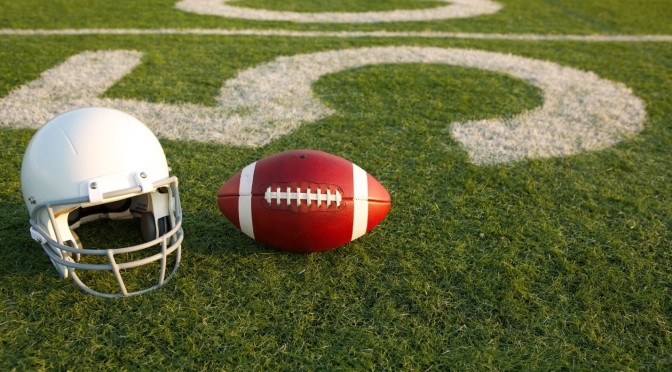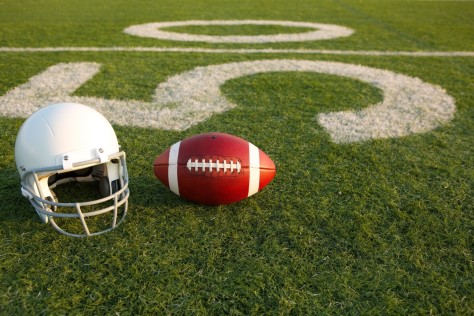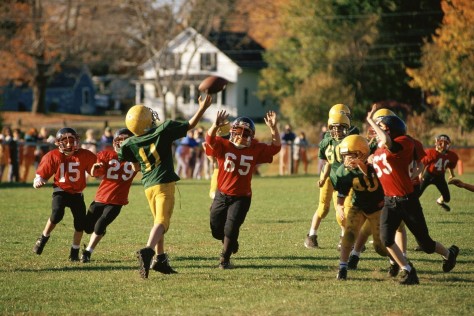The answer depends on whom you ask.
As much as the majority of parents have become increasingly aware of the health risks carried by youth football, only 3 in 10 Americans polled by the HBO Real Sports/Marist College last year said the risks are too great to allow their child to continue playing football. Of the 1,204 U.S. adults who responded to the survey, 85 percent said they would allow their sons to participate in football while only 13 percent would forbid them. A similarly large percentage (74) believed football is a good way of building character and team spirit.
When asked whether the growing body of research regarding the connection between youth football and long-term brain injury has changed their level of concern about their child’s safety, 40 percent said no. Moreover, nearly 30 percent said that they are even less concerned about their child’s safety after seeing how coaches and players are more informed and can protect themselves better on the field.
On the other side of the barricade, experts in sports-related concussions believe youth brains are especially vulnerable to concussions and propose that tackle football should be banned for those under 14 (and replaced with flag football). The evidence is scary: The Centers for Disease Control reported that nearly 122,000 children ages 10 to 19 visit the ER every year for non-fatal brain injuries, while the Institute of Medicine confirmed that football has the highest concussion rate compared with the rest of high-school sports, and that the brain injury rate in prep football is almost twice as high than in college football. On top of everything else, authors of a new study have warned that football players may experience changes in their brain activity long before they exhibit visible signs of a concussion, supporting the belief that brain injury may surface as a result of a succession of several low-intensity hits rather than from one big blow to the head.
Tackle Football, too Dangerous for Young Brains
Contrary to what most people think, young children are not resilient after they are seriously hurt, especially when it comes to sustaining traumatic brain injuries. According to Dr. Robert Cantu from the Center for the Study of Traumatic Encephalopathy of Boston University, children’s brains are especially vulnerable to blows because myelin, the substance that insulates and protects the nerve cells in the brain, is not fully developed until people reach their early 20s. Secondly, youth have disproportionately big heads (further compounded by helmets) and rigid necks, thus causing the bobblehead effect that rattles the axons, capillaries, and blood vessels in the brain similar to an explosive blast.
Granted, children can benefit from playing football and other sports in a number of ways. The sport is said to build character, create remarkable bonds between players, combat child obesity, help children learn discipline, and teach them how to deal with conflict resolution. From a psychological and social point of view, children participating in sports exhibit higher grades, increased self-esteem and confidence, greater family attachment, increased interaction with academically-oriented students, and stronger peer relationships. The positive influence of sports in identity formation and emotional development makes children less likely to drop out of school and more interested in improving their academic performance.
But as parents, you definitely can’t ignore the risks you are exposing your child to when you allow him to play basically the same sport as professional NFLers. Aside from the violence of the game itself, many times it is the negligence of coaches and referees or the lack of intervention from schools that may leave your child with broken bones, spinal injuries, and other long-lasting traumas that could have easily been prevented. And when that happens, you need to hold those responsible accountable by contacting a personal injury lawyer to help you obtain compensation for the medical care of your child and cover additional expenses.
About the Author
Attorney Jeffrey A. Luhrsen credits his military career with the work ethic, integrity, and tenacity that drives his career as a personal injury attorney. Having garnered numerous academic awards and scholarships during college and law school, Mr. Luhrsen has continued to earn accolades throughout his career, including a Martindale-Hubbell AV® Preeminent™ Peer Review Rating, the highest rating an attorney can achieve in legal ability and ethical standards. He has been in private practice since 1998 with a focus on tort claims and insurance disputes. Luhrsen Law Group, based in Sarasota, Florida, is proud to be a family-owned firm that helps Florida families recover after serious injuries and from legal wrongs.



